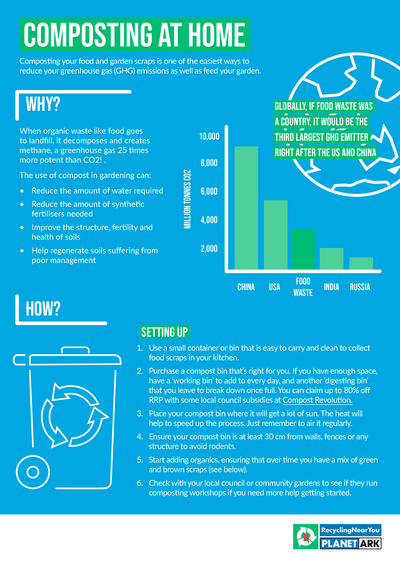Food scraps and organic waste should never be put in your recycling bin at home. Food scraps can be turned into compost via a home composting system or through a specialised food and garden organics recycling service (often run by councils).
Food scraps includes vegetables, fruit, tea, bread, cereals, eggshells, grains, meat, and dairy products. Composting food scraps is one of the best ways households can help fight climate change. It reduces greenhouse gas emissions and turns waste into nutrient-rich soil that can be used to nurture vegetation.
Food Waste Programs in NSW
The NSW EPA's Love Food Hate Waste platform helps households and businesses make the most of their food. NSW residents and businesses can sign up to take part in one of their free programs that are designed to reduce food waste.
How to recycle food scraps at work
If your workplace or business has large quantities of food scraps to recycle, visit Business Recycling to find suitable drop-off or pick-up services.
Is food waste bad for the environment?
Sending food scaps and other organic waste to landfill not only wastes valuable nutrients, but it contributes to climate change. Food doesn’t belong in sealed landfills as they are anaerobic environments, meaning there is no oxygen available. In this environment organics rot and produce methane, a greenhouse gas that is significantly more potent than carbon dioxide. Food scraps and liquids also don’t belong in recycling bins as they can ruin your good efforts and prevent recyclable items from being recycled.
When it comes to food waste, unfortunately, Australians are some of the worst culprits:
- Around half of what we put in our garbage bins is garden organics.1
- According to councils, food organics are one of the biggest contaminants in recycling bins, degrading the quality of recyclable items and possibly preventing them from being recycled.2
- Australian households send 2.5 million tonnes of food to landfill each year.3 Yet more than 2 million Australian households experienced food insecurity in 2022.4
- On the average Australian household, one in five shopping bags of food ends up in the bin, costing each household between $2,000 - $2,500 per year!5
Why should I recycle my food scraps?
Composting food scraps at home or using composting collection services run by councils can:
- reduce greenhouse gas emissions from landfill, and
- reduce leachate production in landfills.
The use of compost in gardening, landscaping, horticulture, and agriculture can:
- reduce the amount of watering required,
- reduce the amount of synthetic fertilisers needed,
- improve the structure, fertility, and health of soils, and
- help to repair soils suffering from poor management.
How to reduce your food waste
No matter how careful we are, we'll always have some unavoidable food scraps such as vegetable peelings. With the right information, minimising your food waste can be easy.
- Try making stocks and condiments from the parts of your food usually going in the bin (e.g. apple cores, vegetable peels).
- Freeze anything that you could eat or use at a later date.
- Donate excess edible food to a food distribution charity like Foodbank or OzHarvest.
- Always check your pantry and fridge before shopping to avoid buying excess food.
- Write and stick to a shopping list of what you need.
- Avoid 2-for-1 deals if it means buying extra food you don’t need that could spoil.
Community Food Waste Programs
If your council doesn't have Food Organics and Garden Organics (FOGO) collection service, there are still ways to make sure your food waste is put to good use. ShareWaste is a free online platform that connects users with neighbours that have composts and are willing to accept food scaps.
Excess food can also be donated to food distribution charities like Foodbank and OzHarvest.
How to use a compost or worm farm
Having your own compost bin, compost heap, or worm farm is a cheap, rewarding way to recycle your food scraps and garden cuttings. Many councils and community gardens run composting and worm farming workshops to help you get started. Worm farms can be kept in courtyards, balconies, or even inside if space is limited.
Fact Sheet – Composting at Home
Click on the fact sheet below for tips on how to set up a compost at home.

Costa's Guide to Composting and Worm Farming for Households
Planet Ark ambassador, landscape architect, and Logie award-winning TV presenter, Costa Georgiadis, explains how to set up a compost or worm farm at home.
More information
Find out how to recycle waste from your garden.
Donate excess edible food to a food distribution charity like Foodbank or OzHarvest.
References
1 National Waste Report 201
2 National Recycling Week Council Survey 2018
3 National Food Waste Strategy Feasibility Study 2021
4 Food Bank Hunger Report 2022
5 National Food Waste Strategy Feasibility Study 2021


